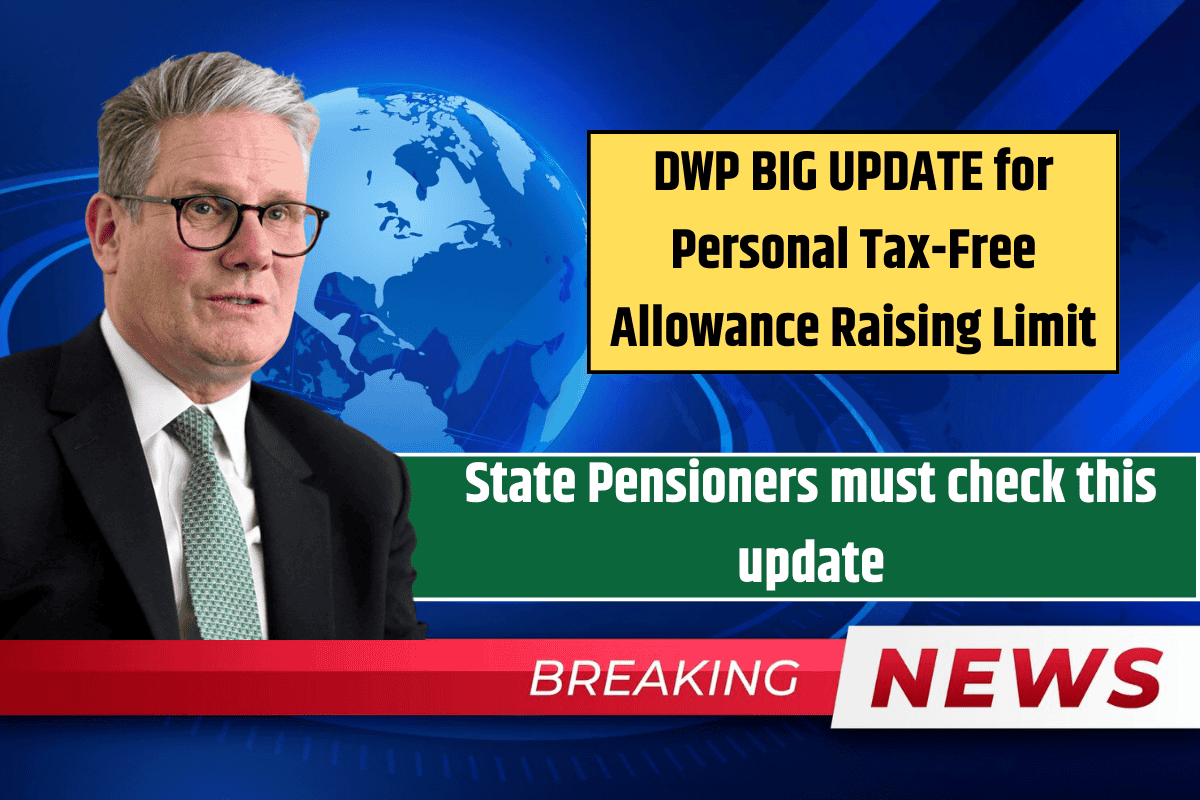DWP BIG UPDATE for Personal Tax-Free Allowance Raising Limit: The HMRC has issued an important update regarding the Personal Tax-Free Allowance for state pensioners in the UK. Recently, there have been discussions about whether the Personal Allowance should be adjusted in line with the state pension to help older citizens manage their finances better. The Labour Party government, which currently oversees the tax department, has addressed concerns and clarified its position on the matter.
What Is the Personal Tax-Free Allowance?
The Personal Tax-Free Allowance is the amount of income you can earn before having to pay income tax. For most individuals, this amount is set at £12,570 for the 2023/24 tax year. If your income exceeds this threshold, you will pay tax at the applicable rate on the income above the allowance.
For state pensioners, this means that if their sole income is the state pension, which falls below this amount, they will not have to pay any income tax. The allowance is meant to provide financial relief, especially for those who rely primarily on state benefits such as pensions.
What Did HMRC and the Government Say?
In response to Ashley Fox, the Opposition Assistant Whip, who asked about raising the Personal Allowance for pensioners to match the full new state pension, James Murray, the Exchequer Secretary, clarified the government’s position. He stated that the Personal Allowance would continue to exceed the basic and full new state pension in the current tax year, meaning pensioners who receive only the basic State Pension or the full new State Pension will not have to pay income tax.
However, the government has also confirmed that the Personal Allowance will remain frozen at £12,570 until April 2028, following the previous government’s decision. This freeze means that there will be no increase in the allowance for the time being, even as inflation and cost of living pressures continue to affect the public.
Government’s Commitment to Low Taxes
Despite the freeze on the Personal Allowance, the government is committed to keeping taxes as low as possible while maintaining fiscal responsibility. James Murray emphasized that, at the government’s first budget, they decided not to extend the freeze on personal tax thresholds, which includes the Personal Allowance. This indicates that while the government is not adjusting the allowance for inflation or aligning it with the state pension, they are focused on maintaining tax rates that are manageable for the public.
Money-Saving Advice for Pensioners
For those who may be confused about how the Personal Tax-Free Allowance works, Money Saving Expert provides helpful advice. They explain that any income earned above the Personal Allowance will be taxable. For the 2025/26 tax year, in England, Wales, or Northern Ireland, the income tax bands are as follows:
- 20% basic rate
- 40% higher rate
- 45% additional rate
Additionally, it’s important to note that once your earnings exceed £100,000, your Personal Allowance will begin to shrink, meaning you will pay tax on more of your income.
The Personal Tax-Free Allowance for state pensioners will remain at £12,570 for the foreseeable future, with no adjustments planned until April 2028. This means that pensioners whose income is solely from the state pension will not be required to pay income tax. However, the government’s commitment to keeping taxes low and fiscally responsible means that changes to the tax thresholds are unlikely in the short term.
SOURCE
FAQs
What is the personal tax-free allowance for state pensioners?
The personal tax-free allowance is the amount of income you can earn before paying any income tax. For state pensioners, if their income is solely from the basic or full state pension, they will not have to pay income tax as long as it remains below the current allowance of £12,570.
Why is the personal tax-free allowance frozen until 2028?
The personal tax-free allowance has been frozen at £12,570 until April 2028 as part of the government’s fiscal policy. This decision was made to control public spending and maintain fiscal responsibility, even though inflation and living costs have risen.
Will the personal tax-free allowance increase in line with the state pension?
Currently, there are no plans to increase the personal tax-free allowance to match the state pension. While discussions have been held, the government has decided to freeze the allowance at its current level of £12,570 until 2028.
What happens if my income exceeds the personal tax-free allowance?
If your income exceeds the personal tax-free allowance of £12,570, you will need to pay income tax on the amount above this threshold. The tax is calculated based on the applicable income tax bands (20%, 40%, or 45%).
